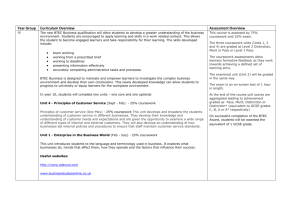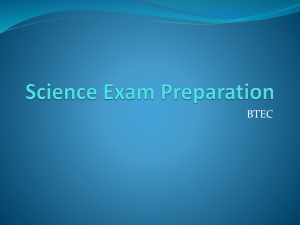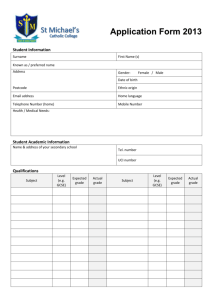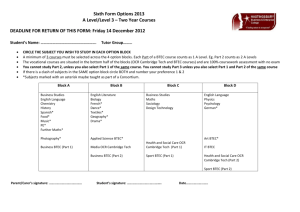Law - Twyford C of E High School
advertisement
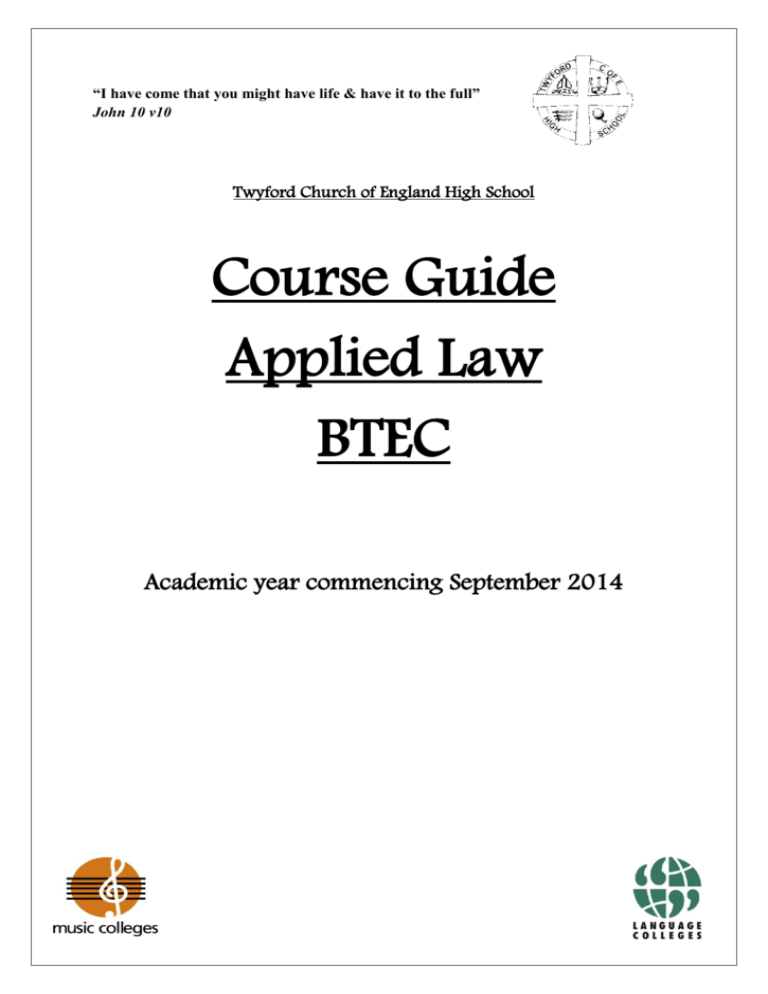
“I have come that you might have life & have it to the full” John 10 v10 Twyford Church of England High School Course Guide Applied Law BTEC Academic year commencing September 2014 Contents 1. COURSE OVERVIEW .................................................................................................................... 3 2. ASSESSMENT SCHEDULE ............................................................................................................ 9 3. GENERAL EXPECTATIONS ........................................................................................................... 9 4. PREPARING FOR LESSONS AND HOMEWORK ASSIGNMENTS ................................................. 10 5. RESOURCES .............................................................................................................................. 11 6. THE LEVEL 4 PROGRAMME YEAR 12 ........................................................................................ 11 7. STRETCHING THE MOST ABLE AND DIFFERENTIATION ............................................................ 12 8. COMMUNITY SERVICE .............................................................................................................. 12 9. ADDITIONAL LEARNING OPPORTUNITIES AND WORK EXPERIENCE ........................................ 13 10. COMPLETING AN EXTENDED PROJECT ..................................................................................... 13 11. CELEBRATING SUCCESS AND STUDENT VOICE ......................................................................... 15 Course Guide – Year 12 BTEC APPLIED LAW Twyford Church of England High School Page 2 of 15 Course starting in September 2014 Course Guide updated June 2014 1. COURSE OVERVIEW We follow the EdExcel BTEC Level 3 Certificate in Applied Law. The qualification is broadly equivalent to one GCE AS level. The qualification is entirely assessed by coursework- there is no exam. You will submit three pieces of coursework over year 12- each piece is worth one-third of the total points available. BTEC courses use a different grade system than GCSE AS levels. Instead you will be awarded a Fail, Pass (70 points), Merit (80 points) or Distinction (90 points) for each unit of coursework you submit. Each of these levels has a number of points attached to it. At the end of the year your total points will be added up to determine whether you come out with an overall Fail, Pass, Merit or Distinction: OVERALL PASS OVERALL MERIT OVERALL DISTINCTION 210 points 230 points 250 points For the sake of university applications, the level you achieve is converted to GCE grades as follows: Pass = E grade Merit = C grade Distinction = A grade Plan for the year: Unit number 1 2 3 Unit Name Dispute Solving in the Legal System Understanding Law Making Aspects of Legal Liability Course Guide – Year 12 BTEC APPLIED LAW Twyford Church of England High School Page 3 of 15 Number of lessons Specification pages 30 21-32 30 30 33-44 45-56 Course starting in September 2014 Course Guide updated June 2014 Unit 1- Introduction An understanding of how and where disputes are solved is an important basis for studying any area of law. It is important that learners understand the difference between civil and criminal law, and how this determines where disputes are resolved. The first learning outcome explores the structure and framework of the courts and the fundamental difference between civil and criminal courts. The second learning outcome looks at the personnel involved in the administration of the law and the types of cases heard in the various courts. The third learning outcome considers alternative forums for dealing with disputes, outside the court structure. The fourth learning outcome considers the finance of advice and representation. Unit 1 Content 1 Understand the hierarchy of the court system- 10 lessons Civil courts structure: role, function and jurisdiction of Small Claims Court, county court, High Court, divisional courts, Court of Appeal (Civil Division), House of Lords, European Court of Justice; difference between first instance and appeal courts Criminal courts structure: role, function and jurisdiction of Youth Court, magistrates’ court, Crown Court, Court of Appeal (Criminal Division), House of Lords; first instance and appeal courts; The Criminal Cases Review Commission 2 Understand the roles undertaken by the personnel of the courts- 10 lessons The legal profession (lawyers): work, training and regulation of barristers, solicitors, legal executives, paralegals; the Legal Services Ombudsman and complaints The judiciary: organisation; selection and appointment of judges; roles in civil and criminal cases; judicial independence and immunity; removal from office Lay people: magistrates – selection and appointment; training; role and powers; jurisdiction in civil and criminal cases; removal; advantages and disadvantages; juries – qualifications and disqualification, selection and role, summoning, vetting and challenging, advantages and disadvantages Course Guide – Year 12 BTEC APPLIED LAW Twyford Church of England High School Page 4 of 15 Course starting in September 2014 Course Guide updated June 2014 3 Know about the alternatives to the courts- 5 lessons Alternative dispute resolution (ADR): tribunals; arbitration; mediation; conciliation; negotiation Comparison: with each other; with civil courts; advantages, disadvantages Issues: cost; time; privacy; appeals; formality; representation; accessibility; appropriateness 4 Know about the finance of advice and representation- 10 lessons Alternative sources of advice: Citizens Advice Bureau; media Finance of advice: private; insurance; conditional fees; pro bono work Statutory provision: legal help and representation in civil and criminal matters Unit 2 - Introduction The first part of the unit explores how law is made by the courts (precedent) and by Parliament (statutes/ acts of Parliament). Learners will be introduced to the sources of law and the development of the common law through precedent. The emphasis concerning precedent will be to show learners that the law is not static but develops as society changes, and how important precedent is to lawyers in giving legal advice. Learners will also look at the legislative process both domestic and European in the creation of legal rules. To develop this area, they should understand the concept of sovereignty, and how this is impinged upon by membership of the European Union, especially the role of the European Court of Justice. Course Guide – Year 12 BTEC APPLIED LAW Twyford Church of England High School Page 5 of 15 Course starting in September 2014 Course Guide updated June 2014 Unit 2 Content 1 Understand how legal rules are created by precedent- 10 lessons Judicial precedent: development of the system; law reporting; binding authorities; persuasive authorities; ratio decidendi; obiter dicta statements; advantages and disadvantages Avoiding judicial precedents: distinguishing previous decisions; reversing decisions; overruling previous decisions; practice statements 2 Understand how statutory rules are made- 15 lessons Statutory legal rules: the pre-legislative process; public and private bills; private members bills; the process in parliament of a bill; commencement of an act; doctrine of parliamentary supremacy; criticisms of the process Delegated legislation: types – orders in council, statutory instruments, by-laws; controls on delegated legislation both by the courts eg ultra vires and parliamentary, eg scrutiny committee; advantages and disadvantages Influences on Parliament: Law Commission; Royal Commissions; political power; media; pressure groups 3 Know how statutes are interpreted- 10 lessons Principles of statutory interpretation: literal rule; mischief rule; golden rule; integrated and purposive approaches; aids 4 Know the importance of the European legislative process and its institutions- 10 lessons European Union legal rules: treaties; regulations; directives and decisions; conflicts between EU and domestic legislation; role and functions of the European Court of Justice, Council, Commission and Parliament; conflict between European and national law Course Guide – Year 12 BTEC APPLIED LAW Twyford Church of England High School Page 6 of 15 Course starting in September 2014 Course Guide updated June 2014 Unit 3 - Introduction Negligence is an area of law that affects the day-to-day life of individuals. Negligence has a particular legal meaning that learners will explore. In very simple terms, it is carelessness for which a person must compensate the person who has been affected by that carelessness. Learners will explore the nature of criminal liability through the actus reus (the act) of crimes and the associated mens rea (state of mind) required for criminal liability. Learners will also explore the differences between crimes of specific intent and crimes of basic intent. Learners will then consider a few offences against the person and develop an awareness of the differences between assault, battery, actual bodily harm, wounding and grievous bodily harm. Finally, the unit considers the aims and different types of sentences available to the criminal courts. Unit 3 Content 1 Understand the impact of the law of negligence- 10 lessons Existence of a duty of care: historical introduction; neighbour principle (Donaghue v Stevenson); threepart test (Caparo) Breach of duty: standard of the reasonable man; factors affecting standard of care – special characteristics of the defendant; special characteristics of the claimant; degree of risk; taking precautions; benefits of taking the risk; relevant case law Damage: physical injury; to property; causation, intervening events, remoteness of damage (Wagon Mound) 2 Know the rules on damages- 5 lessons Damages: remedy; compensatory; pecuniary and non-pecuniary; interim awards; structured settlements; offsets; contributory negligence Course Guide – Year 12 BTEC APPLIED LAW Twyford Church of England High School Page 7 of 15 Course starting in September 2014 Course Guide updated June 2014 3 Understand the elements of a crime- 10 lessons Elements of a crime: differences between criminal offence and civil action; differences between legal and moral rules; the function of criminal law; double jeopardy The actus reus of a crime: causation; voluntary; involuntary and positive actions; omissions The mens rea and fault: intention; subjective recklessness; transferred malice; negligence and duty of care; strict liability; a state of affairs Application of concepts to specific non-fatal offences: assault; battery; actual bodily harm; wounding; grievous bodily harm 4 Know the aims of sentencing- 10 lessons Elements: purpose/aim of criminal sanctions and sentencing; types of sentence for adults, eg custodial, For more information, you can find the total specification at: http://www.edexcel.com/migrationdocuments/BTEC%20Nationals%20from%202010/BN021885_B TEC_Nationals_Applied_Law.pdf Course Guide – Year 12 BTEC APPLIED LAW Twyford Church of England High School Page 8 of 15 Course starting in September 2014 Course Guide updated June 2014 2. ASSESSMENT SCHEDULE As said in section 1, this qualification does not require you to sit any examinations. However, your progress will be monitored against your target minimum grade for Applied Law in the following ways: - Half-termly folder checks - First- draft and final draft coursework levels - Ability to meet deadlines consistently - Homework tasks - Research topics Students who are considered to be working below the standard expected by their teacherin terms of working at a level below their target minimum grade, poor attendance, poor punctuality, poor effort- can expect to face the following interventions: - Compulsory coursework club after school every week - Contact home - Contact with form tutor, head of year and head of sixth form - Interview with parents - Withdrawal from the subject 3. GENERAL EXPECTATIONS The Business Studies and Law department have high expectations with regards to how students approach their studies. The following is a list of minimum requirements: Students will be punctual to all lessons. If you arrive after the 5 minute bell, and without an adequate reason, you may not be allowed to remain in the lesson. You will not have mobile phones on loud and they will be out of sight in your pocket/ bag. You are not allowed to eat or drink in lessons. Students will need to be organised. This will mean ensuring notes are filed in a folder, ensuring you bring pen, paper and a textbook to every lesson. Consistent failure to have the necessary equipment will result in contact home being made. If you cannot produce your homework due at the start of the lesson, you cannot take part in the lesson- you will be asked to leave. The same goes for lesson preparation tasks. Coursework must be submitted (for marking) in a folder and in chronological order by the deadline date and time. If you know in advance that you will be absent, advise your teacher so that you can collect the work that you will miss. Following an absence, see your teacher to collect any missed notes/ resources. Course Guide – Year 12 BTEC APPLIED LAW Twyford Church of England High School Page 9 of 15 Course starting in September 2014 Course Guide updated June 2014 4. PREPARING FOR LESSONS AND HOMEWORK ASSIGNMENTS Preparing for lessons All Y12 students studying AS levels or BTEC Level 3 Certificates are expected to undertake one extra hour of work per subject, per day. This means you should be doing school work for at least 8 hours per day. The type of lesson preparation (prep) tasks you can expect to receive in Law are: Preparation for lesson task Reading Annotate notes Cases Reviewing lesson material Revising lesson material Researching current issues e.g. newspaper articles Assessed Lesson focus and Q & A Check annotations Feedback and used in coursework Q&A Short Answer Questions peer marked Report back You will receive a lesson prep task every lesson Homework tasks You will receive homework regularly- this will be directly related to your coursework. Homework will largely be consolidating what you have learned in the lesson and typing it up in the context of the assessed coursework brief. You can expect to receive between 4-5 hours of Law homework every week; as well as typing up lesson notes for coursework pieces, you can expect to be asked to research reallife past cases and/ or existing and/ or proposed legislation. Course Guide – Year 12 BTEC APPLIED LAW Twyford Church of England High School Page 10 of 15 Course starting in September 2014 Course Guide updated June 2014 5. RESOURCES The textbook is called ‘AQA Law for AS’, published by Nelson Thornes, ISBN number 9780748798650. You can loan these from Student Services for the cost of £10, which will be returned to you when it is returned at the end of the year in a reusable condition. Wider reading lists: - Law Review magazine (we subscribe to this- you can borrow the department copy or buy your own subscription) - The Times Law supplement (can be found on their website) - Department textbooks- see us for these Links to useful websites: - http://www.thetimes.co.uk/tto/public/law/?CMP=KNGvccp1times%20law%20supplement- The Times Law pages - http://sixthformlaw.info/ - Sixth Form Law Info can help you with theory notes and finding case summaries and outcomes - www.direct.gov.uk – provide advice to UK citizens on government and laws, citizen rights and crime and justice 6. THE LEVEL 4 PROGRAMME YEAR 12 A level 4 student in Law is someone who: Loves this subject Wants to become an expert in the legal field, perhaps training to become a solicitor or barrister some day Is well-organised, skilled at consistently meeting deadlines, enjoys undertaking independent research, manages his/her time well and enjoys keeping up to date with media reports of publicised legal cases and pressures for law reform Does at least one hour of extra study per subject each day – this can mean going above and beyond the boundaries of the lesson prep and homework tasks- going the extra mile! Wishes to contribute to the department via their community service- by updating the level 4 notice board with legal cases and current news and promoting the subject at open evenings and to younger students in the school The criteria to be a level 4 student in Law is: Target of a Distinction grade in Law Projected Distinction grade from termly grade sheets Course Guide – Year 12 BTEC APPLIED LAW Twyford Church of England High School Page 11 of 15 Course starting in September 2014 Course Guide updated June 2014 7. STRETCHING THE MOST ABLE AND DIFFERENTIATION Extension activities will be provided in lessons Students are expected to do their own additional reading (see wider reading and useful websites) Students should take advantage of the excellent legal opportunities in London e.g. attend relevant public lectures (see London universities websites), visit Parliament, visit the Old Bailey, visit Inns of Court, University open days etc. Read a broadsheet newspaper weekly. Watch legal dramas and documentaries on TV or in Internet i-players. 8. COMMUNITY SERVICE Students are encouraged to contribute to the department by: Finding relevant news articles for the notice board. Promoting the subject at open evenings and in assemblies. Talking to year 11 students about choosing law at year 12. Being the law student representative for student voice. Being the law student representative in charge of the level 4 notice board. In year 13 there will be an opportunity to mentor year 12 students. Course Guide – Year 12 BTEC APPLIED LAW Twyford Church of England High School Page 12 of 15 Course starting in September 2014 Course Guide updated June 2014 9. ADDITIONAL LEARNING OPPORTUNITIES AND WORK EXPERIENCE 10. Relevant work experience opportunities can be found by contacting legal organisations such as www.Solicitors-online.com to find solicitor firms in your area which you can contact and ask about volunteering. Also contact your local Magistrates court to enquire about shadowing legal personnel. Speakers from specialist organisations will be invited in to school e.g. speakers from Citizens Advice Bureau and the Metropolitan Police. Students can research a topic of their choice and write an essay/present to the class on an area of legal interest not covered on the specification. This is a form of extended project. (Details of the formal Extended Project Qualification (EPQ) for TAP students is detailed below). There will be an organised visit during year 12 to the Old Bailey and Royal Courts of Justice in central London. There will be an opportunity to visit the Galleries of Justice in Nottingham as part of a residential trip in year 13. COMPLETING AN EXTENDED PROJECT Extended projects can be completed in any area of interest in law, but it cannot be a topic that is taught. Topics that could be studied include: - The brutal defence questioning of the Dowler family in the Levi Bellfield murder trial 2011 - The on-going review of UK privacy laws in the aftermath of super-injunctions held by rich celebrities - Are the sentences for serious offences such as rape, strict enough or should they be more lenient? Extended project students will meet with their teacher for guidance and support on a regular basis that will be agreed with individual students. Extended projects are highly regarded by universities and employers and provide something additional to discuss during interview, demonstrating interest and independence in law. Course Guide – Year 12 BTEC APPLIED LAW Twyford Church of England High School Page 13 of 15 Course starting in September 2014 Course Guide updated June 2014 Following is an approximate timeline for completing a project: Time Meeting Purpose of meeting By Feb Half term 1 Discuss planned title / area of research Before Easter holidays 2 Agree working title Mid-June 3 Early July 4 Agree plan for next 3 weeks Assess progress. Agree plan for summer holidays. Complete mid-project review Paperwork Complete Record of Initial Planning (student) Complete Proposal Form A (student) and Proposal Form B (supervisor) Complete Plan at start of project (student) Complete Mid-Project Review (student) Complete Summary (student) and show research completed by first day back in September September 5 Discuss structure for write-up of report Hand in first draft for supervisor to review. October 6 Discuss first draft and Complete End of what improvements Project Review need to be made (student) December Final Submission Complete Presentation Record part A (student) Complete January Presentation Presentation Record part B (supervisor) Complete Reflection (student) Project will now be graded by Supervisor, standardised by Mr Crust and moderated by AQA to decide your final grade Course Guide – Year 12 BTEC APPLIED LAW Twyford Church of England High School Page 14 of 15 Course starting in September 2014 Course Guide updated June 2014 11. CELEBRATING SUCCESS AND STUDENT VOICE - The level 4 notice board will include examples of outstanding student work, specification details, details of relevant University open days, trip details and experiences of ex-students reading Law at university. Students can achieve an award in law through: Demonstrating an exceptional interest in the subject through wider reading Outstanding effort in class and on coursework pieces Outstanding achievement All students will have the opportunity to feedback at the end of each unit. You may have the opportunity to take part in a student voice group who will meet with a teacher at least once every term. Course Guide – Year 12 BTEC APPLIED LAW Twyford Church of England High School Page 15 of 15 Course starting in September 2014 Course Guide updated June 2014

